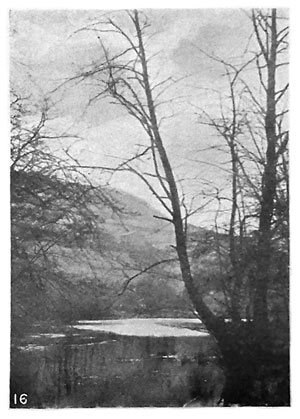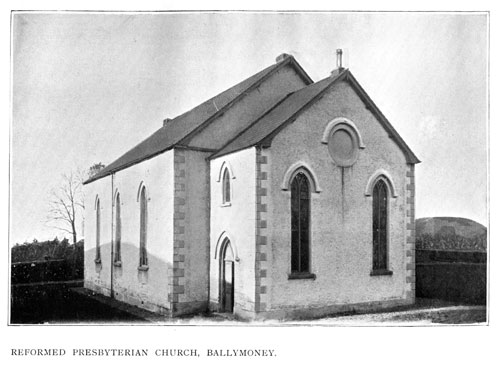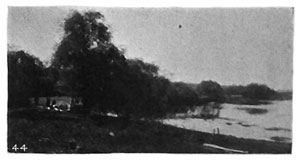Chapter VI.
HISTORY OF THE REFORMED PRESBYTERIAN CONGREGATION.
 THE doctrines of the Covenanted Reformation were carried from Scotland to Ireland and ably proclaimed by Cunningham of Holywood, Livingstone of Killinchy, and Blair of Bangor. The latter preacher was mainly instrumental in stirring up a wonderful revival in the valley of the Six-Mile-Water. Josias Welch, "the cock of the conscience," as he was called from the searching nature of his preaching, son of the more famous John Welch, was settled at Templepatrick and died in 1634. Alexander Peden, "the prophet," driven from Scotland by persecution, wandered and preached around Glenwherry and Connor and northward among the Antrim mountains, between 1682 and 1685. From the labours of men like these, a section of Presbyterians in the Counties of Antrim and Down and Derry were in strong sympathy with the teaching of Richard Cameron and the strict Covenanters of Scotland, who openly disowned the authority of James II. For many years they met in Societies or Fellowship Meetings when they had no minister in Ireland; and they resorted to Scotland for baptism and marriage, and to enjoy communion with their brethren at the Lord's Supper and in the other ordinances of worship. For some years they enjoyed the ministrations of David Houston, who preached, among other places, at Ballymoney, Derrykeighan and near Armoy, and who narrowly escaped the fate of his friend and fellow-labourer, James Renwick.
THE doctrines of the Covenanted Reformation were carried from Scotland to Ireland and ably proclaimed by Cunningham of Holywood, Livingstone of Killinchy, and Blair of Bangor. The latter preacher was mainly instrumental in stirring up a wonderful revival in the valley of the Six-Mile-Water. Josias Welch, "the cock of the conscience," as he was called from the searching nature of his preaching, son of the more famous John Welch, was settled at Templepatrick and died in 1634. Alexander Peden, "the prophet," driven from Scotland by persecution, wandered and preached around Glenwherry and Connor and northward among the Antrim mountains, between 1682 and 1685. From the labours of men like these, a section of Presbyterians in the Counties of Antrim and Down and Derry were in strong sympathy with the teaching of Richard Cameron and the strict Covenanters of Scotland, who openly disowned the authority of James II. For many years they met in Societies or Fellowship Meetings when they had no minister in Ireland; and they resorted to Scotland for baptism and marriage, and to enjoy communion with their brethren at the Lord's Supper and in the other ordinances of worship. For some years they enjoyed the ministrations of David Houston, who preached, among other places, at Ballymoney, Derrykeighan and near Armoy, and who narrowly escaped the fate of his friend and fellow-labourer, James Renwick.
These Society People, Cameronians, Mountain Men, or Covenanters, as they have been variously called, now bear the name "Reformed Presbyterians," on account of their claim to be Presbyterians who maintain the principles of the First and Second Reformations, one of which is the principle of National Religious Covenanting and National Recognition of the Headship of Christ. At the Revolution of 1688 these men refused to take the oath of allegiance to William III., and that attitude they have ever since taken to the British Government.
After the death of Houston in 1696 there was no settled labourer in Ireland till the ordination of William Martin, at the Vow in 1757. He was the first Reformed Presbyterian Minister ordained in Ireland. In 1760 the Societies were divided into two congregations, Martin choosing Antrim and Down, and taking up his residence at Kellswater. In 1763 Matthew Linn was ordained over the congregation of Bannside and Newtonlimavady, the district embraced between the Bann and the Foyle. A Presbytery was then formed, but although other ministers were ordained soon after, the numbers were so reduced by death and emigration to America, that it was disorganized in 1779. It was reorganized in 1792.
For some years William Stavely, who has sometimes been called "the Apostle of Covenanting," was the only minister. He was ordained near Newtownards in 1772, and was instrumental, it is said, in organizing twelve congregations. In his latter days he was pastor of Kellswater and Cullybackey and the whole district of upper Antrim.
His son, William John Stavely, at a meeting of Presbytery held at Garvagh on April 11th, 1804, accepted the call from the Lower Antrim congregation, embracing the people scattered over the district north of Cullybackey. He was ordained at Dervock on September 6th, 1804, to the work of the ministry, "particularly in the congregation of Kilraughts and Dervock." The old communion tokens bear the stamp K.D.C. -- Kilraughts and Dervock Congregation.
A house of worship, which externally has been but little altered, was built in Ballymoney in 1830 and at the meeting of Presbytery, held at Kilrea on October 20th, 1830, a verbal request was presented "for ministerial assistance as a new house of worship in Ballymoney required additional ministerial aid." In 1831 it was proposed to divide the congregation, the societies around Kilraughts to form one congregation, and those around Dervock and Ballymoney to form the other. This was done, and both asked Mr. Stavely to be their minister. He spoke of the harmony that existed between him and the whole congregation, and of the pain it gave him to part with any. If he consulted his own interest and ease and the comfort of his own family he should, he said, continue to be connected with the more opulent, compact, and flourishing, but he felt that duty compelled him to abide with the weaker, more scattered, and less opulent, and so he chose Dervock and Ballymoney. The arrangement was that each place was to receive one half of his ministration and furnish one half of his stipend, which was to be £70 per annum. The first committee named in the new congregation of Ballymoney was made up of the minister, Benjamin Thompson, Malcom Cameron, Thomas Ramsey, John Picken, Samuel Smith, James Warnock, James Lyons, and John Gregg.
Rev. W. J. Stavely, on whom the degree of Doctor of Divinity had been conferred, laboured in the united congregations till his death on the 4th December, 1864, after a ministry of sixty years.

Rev. James Brown, his assistant and successor, had been ordained in 1861. He was widely known even outside his own denomination as a man of rare piety and great eloquence. During his ministry a gallery was erected in the Ballymoney church with seating capacity for 100 worshippers, and the membership of the congregation increased still further until in 1878 another separation was effected and Ballymoney became a distinct organization, Mr. Brown continuing to be its pastor till his death on 28th July, 1883.
The present minister, Rev. J. Ramsey, LL.B., was ordained on December 7th, 1886. Since then the interior of the church has been remodelled, and a manse and farm have been purchased.
Since the organization of Ballymoney congregation the elders have been: William Young Patterson (deceased), John McIlroy, Joseph Lamont, Samuel Lyons, Josiah Lyons, David McClatchey, Hugh Hamill, James Warnock, and James Fleming Taylor.


